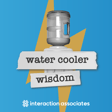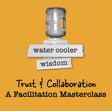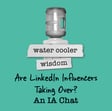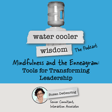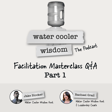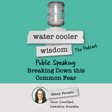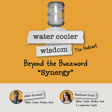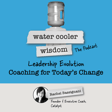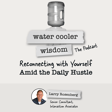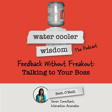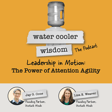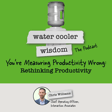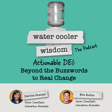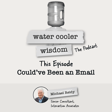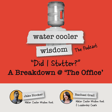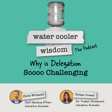The Dynamic Nature of Workspaces
00:00:10
Speaker
In a world where our workspaces are as diverse as they are dynamic, figuring out how to collaborate effectively has never been more crucial. We have teams that span continents, a mix of generations with different viewpoints, and the ever-present challenge of keeping everyone connected and engaged.
Meet the Experts: Susan & Barry
00:00:28
Speaker
To help us piece this together, we're thrilled to have two experts who've been navigating these waters for years, Susan DeGeneres and Barry Rosen.
Welcome to Water Cooler Wisdom
00:00:38
Speaker
Hello and welcome to another episode of Water Cooler Wisdom. I am Jake Blocker. And I am Rachel Grail. Rachel, it is great to have another episode with you. This is now your second episode as a full-time co-host.
Personal Check-ins in Meetings
00:00:53
Speaker
I am excited to be here and I love this topic that we're going to be covering today.
00:00:58
Speaker
Yes, this will be a good one. And something we talk about interaction associates, and we practice in our own meetings, and we'll practice here, is doing personal check-ins whenever we kick off a meeting to lead you into the topic you're going to discuss, just to connect with one another and feel a little bit more comfortable. So in this podcast, we're going to practice it.
00:01:21
Speaker
I love that because I think we never know what people are bringing in to a meeting or to any kind of a project. And it's nice just to know where people are at. Yeah, I completely agree. So Rachel, where are you at? Well, I'm happy to be here in this podcast. Outside of this, I feel like I'm a little bit in a million places at once, which I'm sure lots of people can relate to. So a little bit stretched in, but going to try to bring my full presence today.
00:01:51
Speaker
How are you, Jake?
00:01:53
Speaker
Yeah, same, same. And, you know, for the listeners, we are recording this around the holidays, uh, before holidays. So it's, uh, it is that time, which I think anyone during this time can relate to of you are trying to get everything you can possibly get done, done. So you can start the new year just feeling a little fresh and nice. That is the goal of like, I'm going to hurry up and rush so that I can relax. So January can be easy. And then, yeah, that works for maybe a little bit of time.
00:02:22
Speaker
So yeah, that's, that's where I am right now. I'm, you know, work with that. And then my home too, I've been talking about like how I look around and I just feel like everything's a mess and I want to declutter and clean. So maybe that's what I'll spend next week doing. We'll see. Declutter, de-stress and re-energize. That sounds like a good plan.
00:02:45
Speaker
Yes, I agree. Well, great check-in. So should we get started with today's topic and start introducing our great guests? Yeah. Awesome. I'm excited. Let's dive in, Jake. All right. Let's welcome our amazing
Susan's Career & Enneagram Insights
00:02:59
Speaker
guests. We have Susan DeGeneres and Barry Rosen. So Susan has over 30 years of experience in a training and development industry.
00:03:07
Speaker
And upon joining Interaction Associates in 1990 as Director of Product Development, she's played a key role in creating flagship programs like Facilitative Leadership and transitioning the company's training to virtual and blended formats. She's built and deployed learning for thousands of managers and teams, including General Electric, Novartis, Celanese, Deloitte Greenhouse, and Roche. She's also a certified Enneagram coach for leaders and teams,
00:03:35
Speaker
and is the founder of Still Mind Coaching Solutions. And she holds a BA in Organizational Communication and is a board certified and professional integral coach. Welcome, Susan. I have to ask you as a big fan of Enneagrams, what is your Enneagram? I am an Enneagram type four, which is very uncommon in the world of organizations in corporate America. Yeah.
00:04:04
Speaker
What's the thing? What's the type four called? I know I'm six, I'm the loyalist, although I'm just the anxious one is what that one is. Well, it used to be called the tragic romantic. It's now called the creative intensive. And I'm much relieved to have a different name because it's tragic romantic is not very attractive. And I rejected that identity right off the bat.
00:04:33
Speaker
No, I like that, I like that a lot more. All right, well, thank you, Susan, and welcome.
Barry's Notable Experiences
00:04:38
Speaker
So Barry Rosen, Barry is the CEO of Interaction Associates. He has over 35 years experience in the training and development industry. He's led projects for dozens of organizations, including General Electric, Celanese, McKenzie, Exelon, Capital One, and many, many more. Barry has facilitated meetings with the Democratic Congressional Caucus, the Carter Center, and the Dalai Lama.
00:05:03
Speaker
Barry is a developer of much of Interaction Associates intellectual content, including leadership, teamwork, and facilitation learning programs. Welcome, Barry. Thank you. Good to be here. Any words of wisdom that maybe you can share with us from the Dalai Lama, from your experience working with the Dalai Lama? The Dalai Lama has a great sense of humor.
00:05:25
Speaker
And even under a lot of stress, which he has been under for many years, having escaped from Tibet to India and to maintain his flock.
00:05:39
Speaker
So working with him, he maintains a sense of humor about what's going on in the group and to some extent what's going on in the world, even as he coaches and counsels people to take action. I love it. Yeah. Without getting attached. I think that's what a sense of humor allows you to do. It allows you not to get attached to the seriousness of what's happening, right? He does model that flawlessly.
Insights on Collaboration: Patience & Differences
00:06:09
Speaker
read. Well, you know, I also understand, Susan Barry, that you you all have been working together for over 30 years. So in the theme of collaboration, what have you learned about collaboration in that time working together?
00:06:24
Speaker
Yes, well, that's a lot, I would say. We've learned a lot. Some people talk about having your work wife or your work husband, the person you work with a lot, and I would consider Barry my work husband because we have worked together for so long on and off.
00:06:45
Speaker
One of the things I've learned about working with Barry besides having intellectual integrity in our work is how much patience it takes to work with someone different than yourself. Barry is an Enneagram 0.1, which is quite different than me. And so we come at things from a different perspective, and it's that difference that actually makes the
00:07:14
Speaker
workshops and the things we design together better, but it requires an enormous amount of patience, willingness, and skill. That's what I've learned, how to be patient. Yeah. Barry, anything to add there? Well, as my work wife, I always say yes.
00:07:38
Speaker
I think that something that is important in collaboration is to be able to leverage differences, to appreciate differences and to leverage them and to know and to have the self-awareness to know, you know, I'm under a lot of stress today, so be kind.
00:08:02
Speaker
Because oftentimes i'm money to march on to the next step and susan is going deeper and and plumbing the depths.
00:08:14
Speaker
to find out what would be the most useful thing for somebody to know in the course of a coaching or a training session. And I'm off to the, how do we get to the bottom line and get to the results? So both of those orientations are important.
00:08:34
Speaker
And as Susan said, you have to have a lot of patience for the other person to get their needs met and to get mutual wins, mutual benefits, which is something we'll be talking about in a few minutes.
00:08:49
Speaker
I have to say that I actually had the pleasure to witness the two of you in collaboration. It was probably almost a year ago to the day you were working on building the Better Together program. Barry was terribly sick with the flu and you had flown out, Susan, to work on this. And I just remember being really struck by the qualities of your interaction. Even when you were in pretty strong opposition to each other, there was this sense that you remained a team.
00:09:18
Speaker
that you are committed to each other and really to the shared goals, to making it better, as you both said. So I think that leads us in. We know that collaboration is vital in today's world. We're seeing great strides in the interest of enhancing teamwork in the workplace, especially now with remote and hybrid teams.
00:09:39
Speaker
But there's also this contrasting erosion of collaboration in wider society. We see this all over across political and ideological divides, for example.
What is Collaborative Intelligence?
00:09:50
Speaker
So how are we to think about this across this spectrum? So I'm wondering, Barry and Susan, could you tell us just what is collaborative intelligence and why is it so relevant now? Well, thank you for that introduction to this topic.
00:10:07
Speaker
And let's just define some terms here. One is what is intelligence? And someone is intelligent is that they're able to learn and apply knowledge or skill in a particular area.
00:10:22
Speaker
There could be an intelligent farmer or an intelligent tennis player because you have the ability to see what other people do, adapt and integrate it into your own practice. So collaborative intelligence is the ability to learn and apply knowledge and skills and even attitudes to a collaborative effort, to working together with others.
00:10:49
Speaker
And that we have that basic ability, even as we have an automatic orientation to see us look at things in terms of us and them. And that's what you've pointed to. There's a lot of us and them going on. We also have the ability to move from you versus me to we. We have that basic capability.
00:11:13
Speaker
And of course, it's important to practice it now, to learn how to appreciate, understand and appreciate other people's points of view, even if they're radically different than us.
00:11:26
Speaker
and to not turn them into objects, but to maintain our relationship as human beings. So this is not just a global thing or a national thing. It happens in workplaces and it happens in relationships. So that's why I think it's relevant for us today. I would also say sometimes people think it's kind of Pollyanna-ish or it's a soft skill. And especially when we've got such
00:11:56
Speaker
pervasive, negative experience sometimes of the world today as you were talking about, Rachel, with war and competition and complex dynamics going on in the workplace. But it's not. It's more needed now than ever.
00:12:18
Speaker
We used to say this, it's not the soft skills that are hard. I mean, it's not the hard skills that are hard, it's the soft skills that are hard. So collaboration is, it's an important strategy for bridging the differences and the uncertainty that people are working with now.
00:12:40
Speaker
I like that a lot. Something I think of when you're collaborative intelligence is emotional intelligence. And while there's not many pauses we can pull from the COVID crisis and lockdowns and everything, maybe something semi-positive was at least a light was shine on emotional intelligence from the perspective of leaders and really everyone.
00:13:02
Speaker
although listeners may be screaming at me right now saying they completely disagree, but still maybe a little bit, a little bit there. So I'd love to hear from you of what's maybe the difference between the two or how do they work together, collaborative intelligence and emotional intelligence? It's about wellbeing. I think what you're speaking to Jake is during the pandemic, the focus ended up being silver lining.
00:13:30
Speaker
on wellbeing in the workplace in a way that we've never seen before. And so emotional intelligence is a way of talking about our ability to know ourselves and to regulate our emotions and be more aware of the emotions of others and how to manage relationships. So that focus on our own wellbeing is
00:13:59
Speaker
what we call self-awareness, and that is in fact one of the foundational competencies we talk about in collaborative intelligence. And all the emotional intelligence capabilities about self and other awareness are embedded in what we're calling collaborative intelligence, but collaborative intelligence encompasses a broader spectrum of the human experience. We're talking about the how-to of working better together.
00:14:27
Speaker
like solving problems in ways that yield mutually beneficial outcomes as Barry was talking about, or knowing how to facilitate meetings and conversations so that you include unpopular or outlying points of view, or negotiating differences. I mean, all of us, I think to various degrees or another, find collaborating with others a challenge.
00:14:54
Speaker
because guess what? People don't do what you want them to do. They don't. And so it's what matters, focusing on what matters in terms of how we work together and having the skills to work with each other on what matters. Barry, would you add anything to that?
00:15:17
Speaker
Well, yes, I will add something. Actually, I'm thinking about a foundation to this. It goes back to the Pollyanna idea, is that we automatically have experiences of being different than people, even when we see our family members after a month or so. And we're wondering, do I still belong here?
00:15:45
Speaker
Do I fit in or how come my sister's doing this and my mom is doing that? So it's automatic and it's been accelerated over the last several years, this separation. But what I want to reinforce is that we really do have the capability to work better with others. And the difference between emotional intelligence and collaborative intelligence
00:16:13
Speaker
It's putting together our understanding and our capability to produce a result together that meets our respective needs or the respective needs of two groups or two businesses or two countries.
00:16:30
Speaker
is to apply our innate intelligence to be able to work together and to make the shift from you and me to we. So using social skills, emotional skills, and then applying them to problem solving, planning, and execution together.
00:16:53
Speaker
Go ahead, Susan. Let me just say one thing as you were talking, Barry, it's this kind of fabulous human conundrum or paradox that we are innately built to collaborate. And at the same time, our brains are designed the same way they were designed
00:17:15
Speaker
1.9 million years ago when we were walking the Savannah and they're designed to really keep us safe and they are designed to divide us into us and them so that you can be safe with people who look like you.
00:17:31
Speaker
And so we have both and it's this creative tension between this innate drive towards social connection and collaboration and archaic brain structure that doesn't support it so well.
00:17:47
Speaker
I think what you're talking about here is really exciting because it takes this idea of how can we make choices using our soft skills to actually produce results that matter. So when we're doing that, what does it look like for a group of people or a team to demonstrate collaborative intelligence?
Introducing the PACT Framework
00:18:07
Speaker
How do we know we're doing it right?
00:18:10
Speaker
I would say we've come up with four major qualities of a great collaborative effort or a successful collaborative effort. The first two are that the people engaged in the effort are very purposeful. They're focused on a common goal and they find that what they're working on is meaningful to them. I just have to bring this in. I've been watching the Beatles get back
00:18:40
Speaker
a program that Peter Jackson put together. And what comes out to me is that as a group, they are so intent on creating great music and were able to change the way they were thinking about it, to be influenced by what their bandmates were
00:19:04
Speaker
we're saying. So purposeful and adaptive are two key qualities of a successful collaboration.
00:19:13
Speaker
Yeah, so Barry's talking about this framework we're calling PACT, Purposeful, Adaptive, Considerate, and Trustworthy. And it's a pact that people who work in collaboration can make with each other to behave in a certain way. And so being considerate is really evoking the qualities of both respect but are
00:19:44
Speaker
own abilities to be empathetic and curious, and even compassionate, trying to understand other people's points of view. And of course, behaving in a trustworthy manner, it's a very big deal. People do not give their trust easily. But it's about behaving in ways that are congruent with
00:20:13
Speaker
what you say you value and what's important so that others know that you don't have to love them, but you do care about them being able to get their interests met as well as you getting yours met, as opposed to what we're trained to do more is much more competitive.
00:20:36
Speaker
and a zero sum game where one of us wins and one of us loses. And that's a lot easier really to work like that, not to care about somebody else. It's a lot easier, but it doesn't give the best outcome. I love this phrase, trust is built in droplets and lost in buckets. Oh, that's great. Very lovely.
00:21:00
Speaker
Yeah, Rachel, this actually kind of reminds me of the other episode we recorded on from The Office. I feel like that Stanley and Michael could have used quite a bit of this collaborative intelligence. You were certain that they needed to have a pact with each other, for sure. It's just for me to pact.
00:21:21
Speaker
Really enjoyed all of this as we kind of get closer to the end of this. I'd love to hear from you.
Leaders & Psychological Safety
00:21:28
Speaker
What would you recommend to leaders who are interested in developing this collaborative intelligence for their teams or their organization?
00:21:37
Speaker
Well, one thing that's really important, I think, is leaders have to be role models. So they have to learn for themselves how to have collaborative intelligence so that they behave in ways that influence the environment in which other people work.
00:21:58
Speaker
And I don't think it's just the CEOs, the C-suite leaders, it's leaders at all levels, including project managers, project leaders, supervisors. Anybody who's leading creates an environment that Amy Edmondson made this concept sort of came into the mainstream in the last few years, psychological safety.
00:22:21
Speaker
where people feel like they can take risks and they can step out and make their points of view heard without any kickback. So that there's a level of innovation and creativity and problem solving that can go on when people feel that kind of safety or experience it that way. Well, for me, and as a leader,
00:22:47
Speaker
I think one first step is in the area of feedback and asking for
The Role of Feedback in Collaboration
00:22:53
Speaker
it. We're constantly getting feedback from the environment about how well we're doing, but our colleagues can really tell us.
00:23:02
Speaker
One of the muscle groups of collaborative intelligence is to be able to exchange useful feedback. And step one in that is to ask for it instead of waiting it to come at you. And leaders can start developing their collaborative intelligence just by asking for feedback and letting the people who work with them know how they want it or asking specific questions.
00:23:29
Speaker
Like one I've been working on is how's my delegation going? And am I giving enough guidance in this delegation? And that's one good way to start. There are a number of muscle groups in collaboration, just like we have muscle groups in our body. And so we have the innate ability to develop those muscles. So listening,
00:23:57
Speaker
while speaking in such a way that people really understand what you're trying to achieve, negotiating sound agreements, leveraging differences. These are all basic muscle groups, but I think one great place to start is to ask for feedback. Yeah. And I would say one last thing here that actually I learned from you, Barry, that I think is so important.
00:24:22
Speaker
for leaders to do, and that is to demonstrate their belief in collaboration that working together to achieve a mutually beneficial outcome is possible, even in the face of evidence that shows it's not.
00:24:41
Speaker
the sort of positive outlook with regard to collaboration, I think, makes a huge difference. Thanks. I love that. I'm glad you added that. And I can see how that connects to that pact, that purpose of remembering what it is that we're trying to do really, and that we want to do the hard work of building up those muscles so that we can achieve what's most meaningful to us as a team. It's inspiring to me.
How to Ask for Specific Feedback
00:25:08
Speaker
Yeah, I really love this. Something that stood out for me when I first heard about clever intelligence was that feedback thing because feedback is, it's difficult. It is awkward. There's, there's no way of saying it's, it is a challenge for everyone. And what I pulled from it was that be specific when you're asking for feedback, ask about a specific thing, not just a, Hey, I want some feedback.
00:25:32
Speaker
Then everyone goes into alarm mode of I don't know what to say. I don't know how to react whenever you give me this. But if I say, like you said, Barry delegation, then I can think of that specific time you delegated to me or whatever, and then discuss that. So that's I think that's a big takeaway anyone can take from this.
00:25:49
Speaker
But yeah, I think looking at time where I want to close this out here and just thank you both. Thank you, Barry. Thank you, Susan, for joining us. This is super informative. Love hearing about cloud intelligence. Any last words before we sign off?
Final Thoughts on Collaboration
00:26:04
Speaker
Thank you for inviting us to your program. And I've enjoyed being here and I look forward to doing it again.
00:26:13
Speaker
And collaboration is possible and it can work. Yay. And it is worth it too. And I feel like you've laid out kind of a picture of how to do it and that feels really exciting. Thank you. Thank you both so much for being here. It's been a delight. Thank you both. And thank you listeners and we'll catch you next time.
00:26:34
Speaker
Thanks for listening to Water Cooler Wisdom. This podcast is brought to you by Interaction Associates, a leading professional development and leadership training organization whose mission is to help people work better together. If you'd like to learn more, visit interactionassociates.com. If you have questions, comments, or are interested in collaborating with this podcast, you can email us at watercoolerwisdom at interactionassociates.com.

